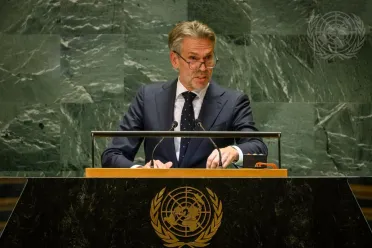Statement
Statement summary
DICK SCHOOF, Prime Minister of the Netherlands, addressed “anticipating an unknown future” and the need for “responsibility that goes beyond the scenarios we want to imagine” — beyond national borders, and above all, beyond short-term solutions. This includes reforming a Security Council that must be divided better geographically, “with permanent African representation at the very least”. He further noted that the manner in which war and conflict are waged is changing, with more countries developing offensive cyber programmes that pose a growing threat to critical infrastructure, security, earning capacity and intellectual property. Further, the Declaration on Future Generations, co-facilitated by Jamaica and the Netherlands, represents “a shared desire to work towards a fair and secure life for everyone”.
Turning to climate change, he noted that from flooding to drought, the effects are impacting people around the world — including parts of the Netherlands, “and not least the small island developing States”. All the problems caused by climate change amplify each other, and every country is directly affected, requiring cooperation — including committing to the climate targets of the Paris Agreement, and the measures to be agreed upon at the twenty-ninth session of the Conference of the Parties to the United Nations Framework Convention on Climate Change (COP29). The Netherlands, he noted, has a long history of managing water, and uses that experience around the world. For Sudan, where 25 million people are facing acute hunger, he recalled that earlier this year his Government made an extra €10 million available, bringing its contribution to the crisis response to €80 million.
In Europe, he stressed that the victims of the Russian Federation’s war are not limited to Ukraine alone. Since the global food supply has been deployed as a weapon of war, millions of people have been pushed back into hunger and poverty. The Charter of the United Nations is clear on this subject: no State may use force against the territorial integrity of any other State. He called for challenging those countries who support Moscow’s defence industry or help it circumvent sanctions. “And it means calling Russia to account for its actions,” he said, pointing to the International Criminal Court and the International Court of Justice — “two pillars of accountability, based in my own city, The Hague”.
On the subject of collective responsibility, he recalled that almost a year has passed since the terrorist organization Hamas committed its atrocities, and war broke out in Gaza. The suffering since then has been extreme. In the past few days there have been a large number of civilian casualties in Lebanon. “A major regional war must be prevented at all costs,” he stated — “and so must any new attack on Israel”. This begins with supporting international diplomatic initiatives, such as the proposal by the United States and France for a temporary ceasefire. It is urgent to “break the endless cycle of violence and help them see ‘the other’ for who they are”, he stated, and the first steps are obvious: an immediate ceasefire; the immediate and unconditional release of all remaining hostages; rapid, large-scale aid for the people of Gaza; and compliance with international law. “I know that simply wanting something is not the same as making it happen,” he said, “but, as Nelson Mandela said, ‘It always seems impossible until it’s done’”.
Full statement
Read the full statement, in PDF format.
Photo

Previous sessions
Access the statements from previous sessions.
